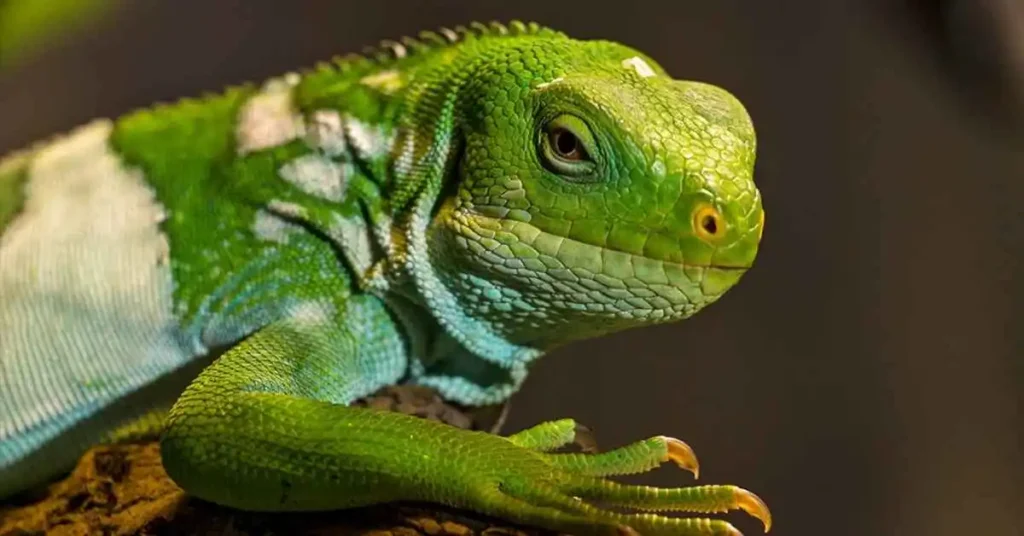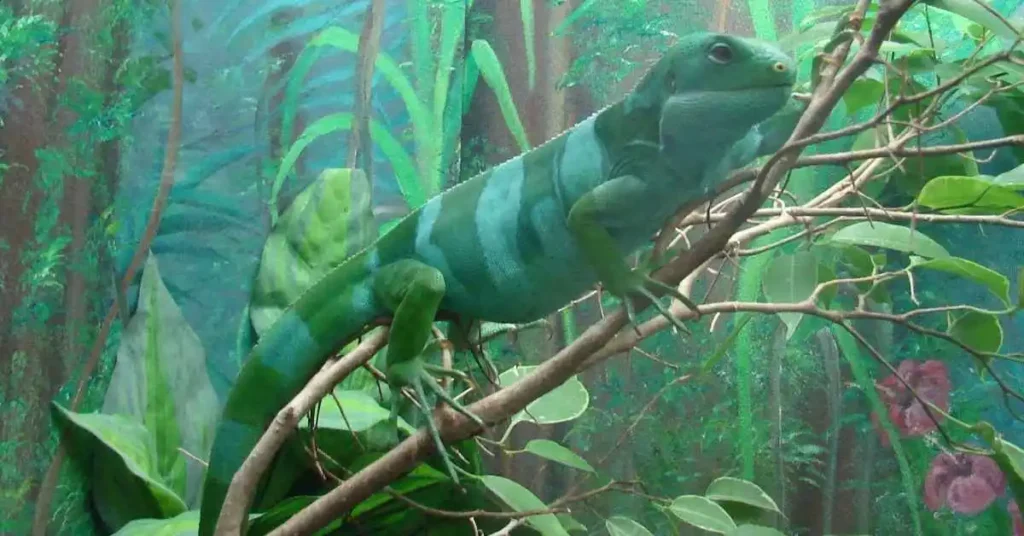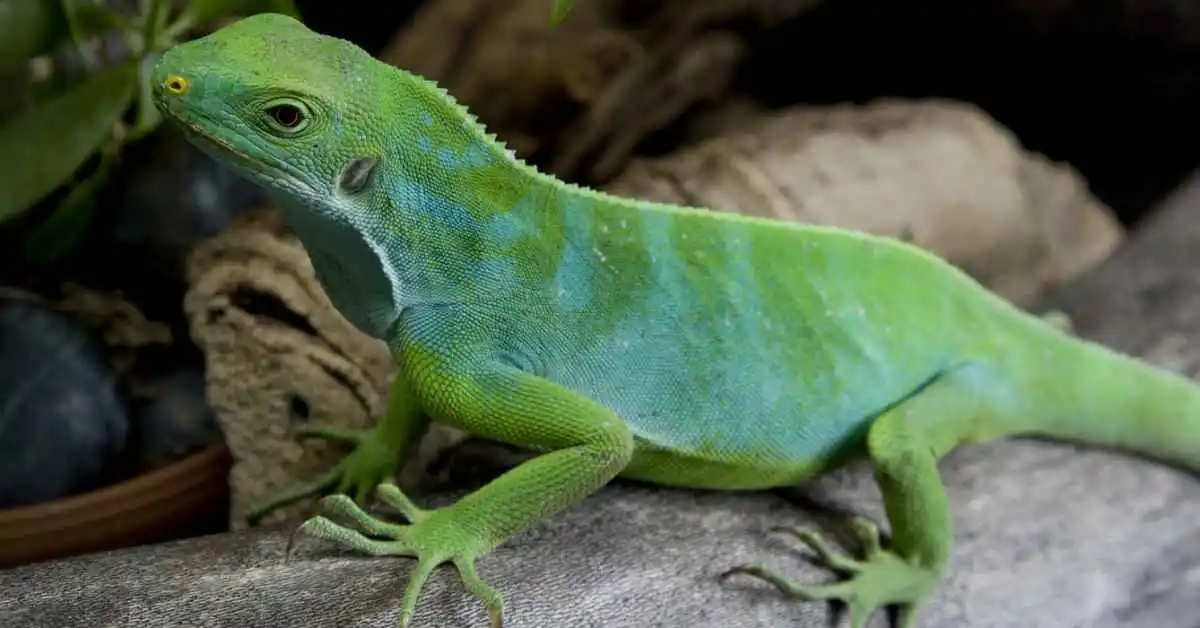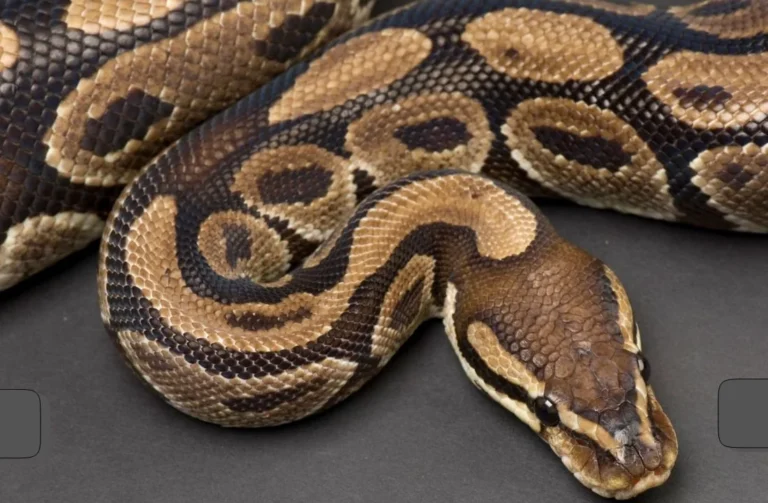Fiji Banded Iguana Housing,Lighting and Appearance
The Fijian banded iguana (Brachylophus fasciatus) is a striking and robust lizard found on the islands of Fiji and parts of Dunga. They are known for their striking green coloration with blue or white bands (in males). This iguana is not only a symbol of the Fiji Islands, but one of the most beautiful reptiles in the world. Both sexes are very proud of their bright colors, with females sometimes being solid green and blending into the lush tropical vegetation of the habitat that supports them.
Facts of Fiji Banded Iguana:
| Common Name | Fiji Banded Iguana |
| Scientific Name | Brachylophus vitiensis |
| Age | Typically reaches maturity around 2-3 years |
| Lifespan | Can live up to 20 years or more in captivity with proper care |

Appearance of Fiji Banded Iguana:
The fuzzy-banded iguana is an iguana known for its green coloration, in which males are adorned with blue or white bands. If males and females are compared, males are brighter than females which shows their own distinct bands, especially during the breeding season. The iguana’s eyes are mostly expressive and move freely. They have the ability to find prey and find their food.
Housing for Fiji Banded Iguana:
Fiji-banded iguanas require a spacious enclosure to mimic a natural tree habitat in which they can live. An ideal wall would be four feet long, three feet wide, and two feet deep to provide climbing space for the fuzzy banded iguana. Temperature and humidity levels are also very important to them, which requires maintaining a temperature of 75–85°F, with basking sites reaching 90°F.
Enclosure
The size of the Fiji Banded Iguana must be very large. Fiji’s forests are dense, mimicking a tropical environment. Enclosure size should be four feet long, four feet wide, and two feet deep to allow maximum space for these animals. The enclosure should include branches, vines, and leafy plants that create a perch and allow the iguana to move naturally.
Substrate
The substrate needs to be supported to maintain optimum moisture levels. It is also safe for the fuzzy banded iguana and easy to clean. For example, when choosing something for them, they include coconut husk, orchid bark, or cypress mulch, as these materials help to maintain moisture levels well and maintain proper moisture levels. Keep uniform It is important to keep the substrate evenly moist.
Humidity
A humidity level of 70-80 is necessary for growing fuzzy banded iguanas. Using in-wall moisture levels and measurements to monitor and adjust where they are needed. Additionally, providing a shallow dish of water to add moisture to the air may help them. It can also go a long way in providing a healthy, comfortable environment for the iguana.
Temperature
For the health and well-being of the Fiji Banded Iguana, maintaining an optimal and clean environment and temperature is essential. For them, day and night temperatures are quite different, with day temperatures of 80-85 F and nighttime temperatures of up to 75 F, the basking temperature in the area. Temperatures can reach 90 Fding warm conditions, and a simulated environment develops where they thrive.
Lighting
The Fiji Banded Iguana needs adequate light to nurture to keep it healthy and fit. These needs are met by UVB light. They need to produce vitamin D3 to absorb calcium for their bone health and overall health. Providing them with a light cycle that mimics their light is essential for an iguana. UVB light can be increased to 10-12 insects by basing
Water source
The Fiji Banded Iguana needs constant, reliable access to fresh water for its hydration. Iguanas drink water drop by drop from the many leaves or moist leaves to quench their thirst. It is very important to keep an eye on the amount of water in the walls to maintain the required humidity level. Fiji Banded Iguanas are generally healthy and fit and require proper grooming.

Cleaning and maintenance:
Cleaning daily stops the build-up of bacteria and ensures an optimal living environment. For them, keeping the walls clean and removing the waste and food they eat is very important for their health and well-being. It is also important to maintain the proper conditions to keep the iguana healthy and growing well.
Lifespan of Fiji Banded Iguana:
Its in captivity is usually 20-30 years. If they are properly cared for and dealt with in the right conditions, they can live longer. Due to bad conditions in the forest and the presence of predators, their lifespan may be shorter.
The behavior of Fiji Banded Iguana:
The Fiji Banded Iguana is a diurnal creature that is active during the day. It is known for its improved coloration when it basks in the sun and feeds on a diet rich in leaves and flowers. It is sometimes skillful and found in trees, where it can find both food and shelter. When threatened it may hiss or hiss to appear very large, but this is rare.
The Breeding Process of Banded Iguana:
It breeds in the warmer months with mating occurring in October-December. Males use excellent courtship to attract females such as head bombs and colour displays. After successful mating, the female begins to lay eggs, usually two to six eggs in the Italia delle substrate. Eggs are incubated for about 60 to 90 days to suit the environment.
Diet and Feeding of Fiji Banded Iguana:
Fiji-banded iguanas are herbivores with a diet consisting of leaves and flowers. Their diet consists of a wide variety of nearby plants. Delivery is necessary. Hydration of fuzzy banded iguanas should be done by offering them fresh water.
Fiji banded iguanas as a pet:
Known as the Fijian Banded Iguana, it is a rewarding animal to talk to but requires careful consideration and care as it lives and thrives in a wide range of habitats. In addition, it is important to maintain climbing shelters and adequate light temperatures, which are around 85-95 F.
Common Health Problems of Fiji Banded Iguana:
Fiji Banded Iguanas tend to develop health problems that require their owners to take care of them. The most important problem is that they have metabolic bone disease (MBD), which is often caused by insufficient UVB light and insufficient calcium intake. They also develop respiratory infections that can be caused by inappropriate humidity levels, stress, or other temperatures.
Conclusion:
The Fiji Banded Iguana is a remarkable animal that thrives in a carefully nurtured environment that is unique in its appearance. Iguanas present a beautiful biological representation and prove to be excellent pets for their owners, often living up to 20 to 30 years in captivity to ensure their health and longevity. For these animals, optimal enclosures should be used and their size should be optimal, UVB lighting should be provided for them, and their proper care and feeding and health problems should be provided optimally.







